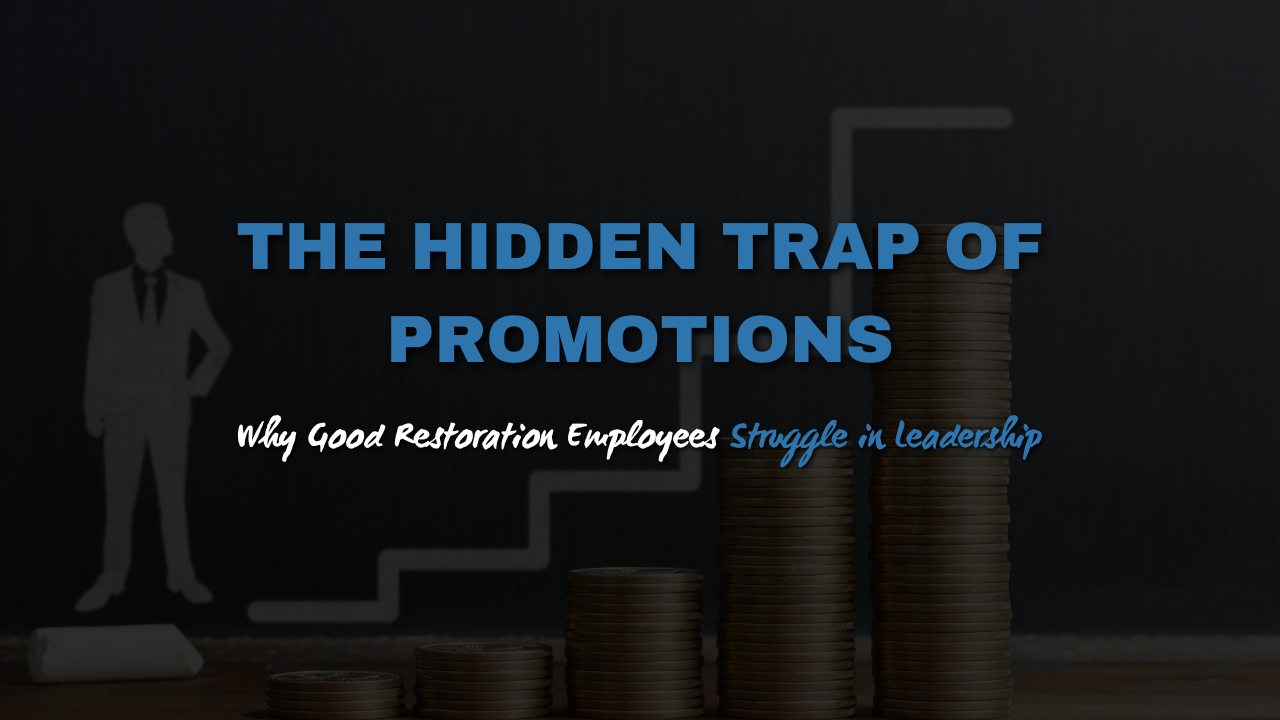
The Hidden Trap of Promotions: Why Good Restoration Employees Struggle in Leadership
Feb 26, 2025The Hidden Trap of Promotions: Why Good Employees Struggle in Leadership
Most restoration companies promote their best people when it’s time to scale. A top-performing tech gets moved up to a managerial role, and suddenly, they're not just handling jobs—they’re leading a team. It sounds like the natural progression of growth.
But here’s the problem: promotions based on skill, not leadership readiness, often stall a company’s progress rather than accelerate it.
Why? Because technical expertise and leadership are two different skill sets. And most companies don’t invest in preparing employees for that transition.
This is why so many talented employees either struggle in their new role or leave altogether. They were great at their job—but now, with more responsibility and no real support, they feel like they’re failing.
If you’re running a restoration company and want to retain your best people while actually helping them grow, here’s what you need to understand:
-
Promotions without leadership training create unnecessary struggles.
-
The Peter Principle explains why people get promoted to their level of incompetence.
-
Your best technician doesn’t automatically make a great manager.
-
Leadership is a skill that must be developed, not assumed.
-
Fixing this issue leads to smoother operations, happier employees, and sustainable growth.
Now, let’s talk about why this happens—and how to fix it.
Why Promotions Can Backfire
A Manager from a mid-sized company in the NorthEast reached out to us. He enjoys our content but pointed out something interesting—there’s very little guidance for employees, especially those moving into leadership roles. Most of what’s out there is for owners, not the people running the day-to-day operations.
This got us thinking.
Many companies assume that promoting their best employees is the key to growth. And while recognizing talent is important, failing to prepare those employees for leadership often leads to frustration, burnout, and turnover.
This phenomenon is nothing new. It was described in The Peter Principle, a book by Laurence J. Peter in 1969. The principle states that employees are often promoted based on their current job performance, not their ability to succeed in the next role. As a result, people keep getting promoted until they reach a position where they’re no longer competent.
In the restoration industry, this looks like your best mitigation tech getting promoted to a management role. But instead of leading a team effectively, they find themselves overwhelmed. Their old position is filled by someone less experienced, so instead of focusing on leadership, they spend most of their time fixing mistakes and compensating for the knowledge gap.
The Reality of a Bad Promotion
Imagine this:
You promote your top-performing mitigation tech to a manager role. He’s excited, takes pride in his work, and wants to prove himself. But within weeks, he’s swamped with new responsibilities—scheduling, handling customer escalations, managing payroll, and training new hires.
Meanwhile, the person who replaced him in the field doesn’t have the same level of skill. Jobs start running over budget, mistakes happen more frequently, and clients aren’t as happy. Instead of leading, your new manager is now stuck filling in gaps, running out to job sites, and putting out fires.
It doesn’t take long for frustration to set in. What was supposed to be a promotion now feels like a demotion with extra stress.
And before you know it, that once-loyal employee is looking for another job.
How to Fix It
The good news? This isn’t inevitable. You just need a better approach to leadership development.
-
Stop promoting based on technical skill alone. Being great at a job doesn’t mean someone is ready to lead. Instead, look for problem-solving ability, emotional intelligence, and communication skills.
-
Create a leadership pipeline. Before promoting an employee, start training them for leadership. Offer mentorship, management training, and hands-on coaching.
-
Support your new leaders. Don’t just throw them into a new role and expect them to figure it out. Give them the tools they need—standardized processes, clear expectations, and ongoing feedback.
-
Backfill roles strategically. When promoting someone, make sure their replacement is properly trained. A promotion shouldn’t create a talent vacuum in your frontline team.
-
Encourage a leadership mindset. Teach employees that leadership isn’t about doing more work—it’s about empowering others to succeed. This shift in perspective changes everything.
A title doesn’t make a leader—preparation does.
If you want to grow your restoration company without stalling, start thinking beyond promotions.
Focus on developing leaders, not just filling roles.
When you invest in leadership training, your team stays engaged, your operations run smoother, and your best employees actually want to stay and grow with you.
And that’s how you scale—without burning out your top talent.
Stay connected with news and updates!
Join our mailing list to receive the latest news and updates from our team.
Don't worry, your information will not be shared.
We hate SPAM. We will never sell your information, for any reason.
